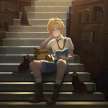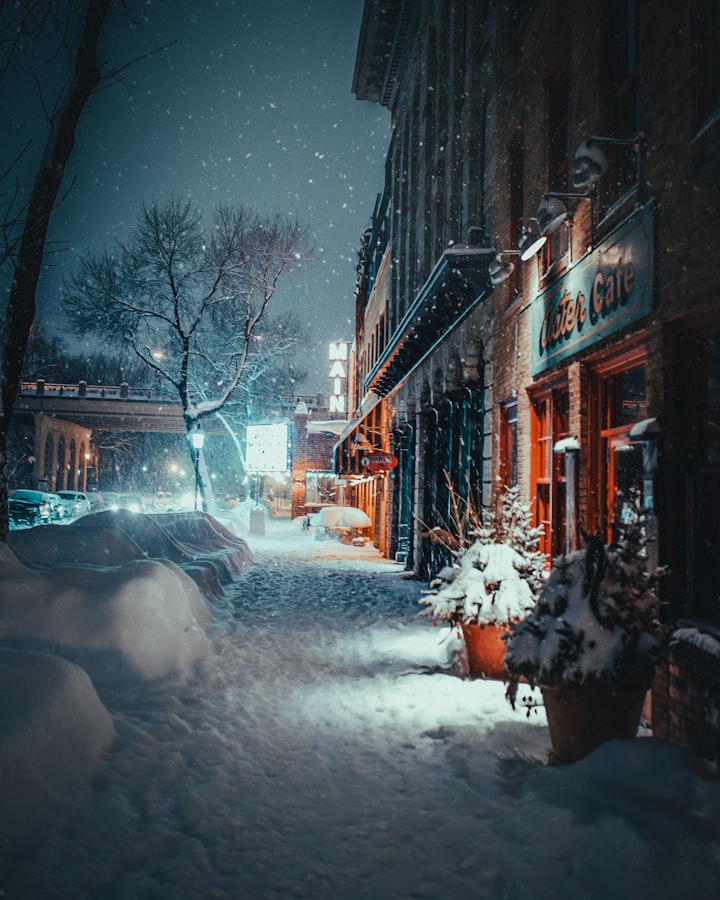The city lights glimmered in the boy's eyes; a few cold and stinging tears rolled down his cheeks as he buried his face into his arms. Leaning against the railing atop a skyscraper at midnight, he felt his heart branding an unbearable pain onto his soul. Snow gently fell, dancing with the breeze which played with the long, silky hair he had grown to beneath his shoulders. There was nothing he could do about his current situation, and life never let him escape from the harsh reality he lived in.
"Someone," said the boy, falling to his knees as he began to plead. "Save us, please," although he knew he was undeserving of whatever help he could ever receive, he pleaded with the world, who he assumed had no ears to listen. It wasn't that he lived his life wrongly, but rather he was selfish and never led himself to remain within the light for long. "I am weak," he acknowledged the truth, hesitating for a moment. "I am nothing but a drop of water in a vast ocean."
His words turned intelligible—the tears he fought so hard against streamed down his cheeks, and he couldn't help but slam his fists on the floor, holding back screams that'd disturb the city. He let himself fall, defeated. He was defeated, but not alone, as the world's heart heard his plea and lent him a hand.
Suddenly, he felt warm, despite the outer cold. His tears slowed to a halt, a sense of serenity coming over him—he sat there pondering his options and regained his composure. The boy thought a walk would be good for him, despite the time.
He had no destination; he felt he should explore and observe his surroundings for the first time, having never taken a good look at the world around him before. Seeing children with their families reminded him of the good old days: he was nothing but an eight-year-old kid who had no worries, no debts, no drama to involve himself with—simply a child, free from the damning tribulations of life. He only wished he hadn't done what he did when he was dumb, fifteen, and in love—decisions he made in the midst of his teenage ignorance.
He chuckled at the thought of it, the thought of thinking that his past relationships were real love—when in fact, his past relationships were everything but love—it was nothing compared to what he had now. He supposed he never knew what love actually was until he experienced it, but when would he know that he has experienced it?
He noticed a homeless man sitting outside a restaurant; what was he doing there? It was too cold to be sitting outside—but maybe the shelters were full.
The boy thought of his suffering as he passed the man, his sign reading: 'Anything helps,' while he was asleep. Someone had given him a thick coat to keep him warm. The boy hadn't much money, so he hesitated to help him. The restaurant he slept beside operated overnight—curious, the boy entered the establishment.
The man woke from a dream of times past—the times when he had a family who loved him and had happiness decades before. He felt invisible to most of the world now—nobody cared to acknowledge him, nor did they care to stop for a chat. It barely felt like he was human; he was an outcast—nobody could bear looking him in the eye. The boy who entered the restaurant was the same as any other person to the man, so he stood from where he slept and walked away.
The boy made his decision—it didn't take much longer than ten minutes to get the food, the coffees, and leave. When he got out and looked where he saw the man, he was gone.
"Damn!" said the boy, looking around the streets for him. He saw the man turn the corner northeast and pursued, clenching what he bought for him so the coffee wouldn't spill. "Wait!" yelled the boy down the street, gaining the attention of other bystanders, but the man kept on with haste.
The boy continued in hot pursuit, dodging pedestrians one after another—the man was barely in sight—until finally, the boy, winded, stopped near an alleyway.
"You've been following me," said a man standing behind the boy. He yelped, instinctively jumping away—he nearly dropped the goods, but his grip was tight enough to keep them safe.
"You nearly gave me a heart attack!" said the boy, catching his breath. He gulped, relaxing as he realized it was the homeless man.
"Why, it's me who's more likely of a heart attack than you," joked the man. "Why have you followed me?"
"I wanted to give you a meal," he looked at the coffee, which had spilled some over its lid. "I tried to keep it neat too, but...that was more difficult than not."
"Hah," laughed the man, "I don't have the luxury of worrying about what's neat or not these days. It's okay; I thank you anyway."
"I thought that you might enjoy a hot cup of coffee in this cold weather."
"Maybe I would," said the man, placing the meal down as he sat to eat it.
"Do you mind if I ate beside you?" asked the boy, who had his own dinner too.
The man nodded, "Go ahead, no one's stopping you—it's a free country!"
They ate with one another in silence; it looked as though the man hadn't eaten good meat in a while; he took his time and savored every bite. The boy wanted to say something, but he didn't know what. He couldn't help but stare at the man eating his dinner.
The man glanced in his direction, and the boy adverted his eyes. "So," said the boy, "How have you been?"
The man stared at him and laughed, "How have I been," under his breath. "What's your name, son?"
"Frederick. Frederick Jacobson—and yours?"
"Hah—it's not important anymore. Nobody's called me by name or has asked for it in years. You can call me Sebas, my nickname," the man took a sip of his coffee, "Thanks again for dinner."
"It was no problem, really," said Frederick, thinking of how little money he has left until his next paycheck. Warming up to Sebas's company, he noticed the aura of sincerity and humbleness that shrouded Sebas. He wondered what got him in his situation in the first place.
"It's simple, really," said Sebas out of the blue, "I destroyed my own life, and by the time I realized it, it was too late for me to fix anything."
"Huh?" said Frederick—was he thinking aloud? "How so?"
"I have a story to tell if you want to hear it."
"I have time," he looked at Sebas, watching him have flashbacks.
"Where do I start?" he smiled and began to tell Jacobson his story—the story of how he had everything he ever wanted in life, to how it all came crashing down.
Sebas had his dream job, making good money alongside a wife who loved him and a family who supported him. He told Jacobson about his stubborn, strong, and independent wife, who was way handier than his nerdy self ever was—yet, despite her strength and superiority, she remained humble and kind, supporting him and his ambitions just as he had supported her.
Jacobson thought Sebas's wife sounded much like his own—and the more Sebas spoke about his life, the colder Jacobson felt. His words were all too familiar—his troubles were too close to his own.
Nearly two years into their marriage, after their first child was born, Sebas's wife was hospitalized. One thing led to another—the company she worked for went out of business; they couldn't pay the mortgage on their home; their debts accumulated as his wife was treated for disease—eventually, everything collapsed.
Chills jolted up Jacobson's spine—he felt uneasy; his head was spinning.
A few months after Sebas was forced to surrender his daughter to his parents, his wife passed. This was the breaking point—he lost everything: his home, his job, his loves—he even lost the self-control he worked so hard to achieve after meeting his wife.
He resorted to using the drugs from his teen years; the difference was he had no restraint now—it was the only way he knew to feel good again. His family shunned him for it, and he left to fend for himself on the streets.
Sebas recounted his life to Jacobson, who felt like his life was being read to him with details he had not recognized himself.
"Sebas," said Jacobson, hesitant to address the resemblance of his life to Sebas's. He felt dizzy.
"It's true, Jacobson," said Sebas, responding to his thoughts, "This life I told you about was your own, and this is how it'd end for you too."
"No," muttered Jacobson, his heart racing, "No, no, that can't be true, you're lying! You're crazy!"
"If it weren't true, then how would I know that in secret, you'd count in how many seconds you could put your head through a pull-over shirt to be sure it was less than three? Because if it were more than three, you felt a demon chasing you for a moment."
"How do you know that?"
"I also know that you wish your will power could be stronger than what you have now, because if it were, then all you've struggled with wouldn't have been a problem in the first place."
"No way, I—"
"But I'll have you know that you're wrong! You've thought that you can do this alone, that you must be able to do this alone because that is your only option, but it is not so! You're not alone, you don't have to be alone, and so you mustn't be so—you mustn't ostracize yourself and let your own mind and being fall to ruin because of misguided beliefs.
"You're not alone, as you have your family, as you have your love, as you have your daughter, too, believing in you! Believe in them, too, as they will support you in this desperate time, should you let them do so—do you want to end up the way the future has been written?"
"No," hesitated the boy, "Ah...of course not."
"Then," concluded the man, "Surrender," Jacobson broke down once more—except, this time, he felt warm and tender. The man held him tight and lent him a little black book. "I know it's hard, but start here and now."
"I surrender," cried the boy, "I surrender."
"You are strong, but not strong alone," said the man. "This book has all that you need within it for now...please—read it—and write within it too."
For the first time in a while, the boy felt okay and took the book.
"Thank you," said Jacobson, looking up as he tried to stop his tears, but the man was gone. He still felt his warmth, and his words were still fresh in his mind—he was determined to change the ending he was recounted, but how?
He had no money to cover his wife's treatments and to pay off his mortgage—but then he remembered what the man told him—he was not alone.
Now sitting in a coffee shop, the boy opened the little black book to the first page. A check fell out of it—the page read: "The world stands beside you, not against you," and the following pages spoke of a mysterious benefactor known only to the man, who'd support him for a time. He picked up the first check, which read $20,000 in Frederick Jacobson's name.
He was stunned, left speechless, and rushed to the bank to make the deposit—the money went through, which was now his to spend on his wife's hospital bills, debts, and to support his family. In exchange, he read the little black book and wrote about his life in it as he was asked.
"The future is only revealed when it is meant to be changed," read the book. Jacobson committed himself to living in light—to living a selfless life. To Jacobson, he knew not whether the man was an omnipotent spirit, or some seer doing kind work, but he knew his plea was heard.
In the end, he recounted the story of how his life was saved alongside his wife's to his children and grandchildren; he was more than capable of avoiding his grim fate with the help of those who loved him and the help of the inexplicable.
About the Creator
Louie B. Shulk
I write to make my dreams a reality, one way or another — it is both literal and figurative. Words paint stories, and I hope my stories will strike readers' souls.







Comments
Louie B. Shulk is not accepting comments at the moment
Want to show your support? Send them a one-off tip.